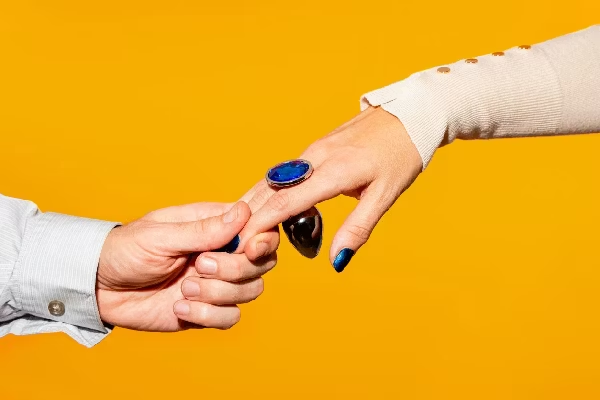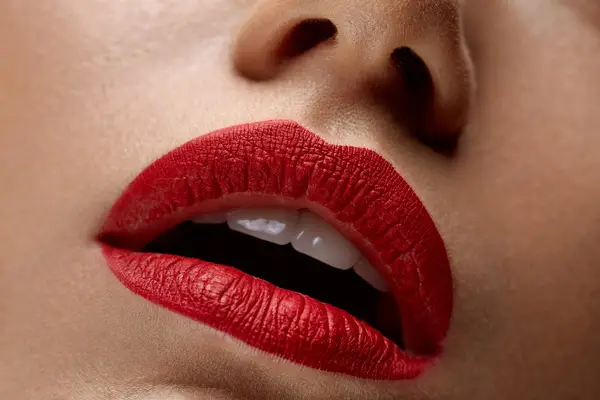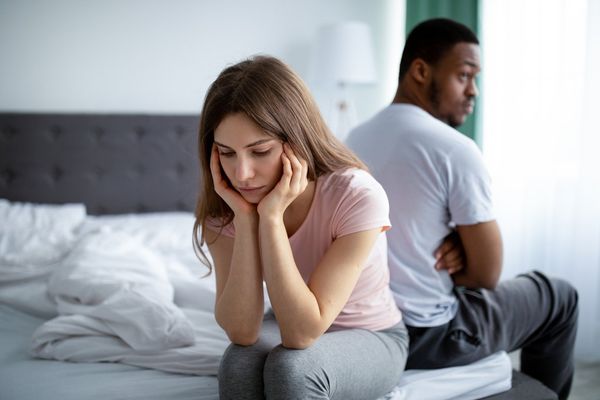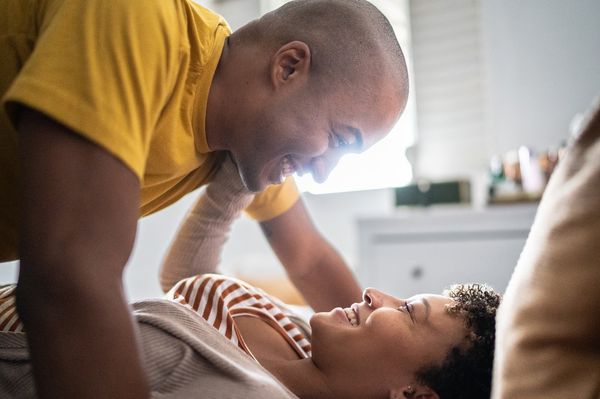I've always considered myself a sexually energetic woman. Starting in adolescence, I was highly curious about sex and sexuality, drawn to reading, talking about and exploring aspects of desire. In college I came out as bisexual and spent years dating women before falling in love and marrying a cisman. Although my libido waxed and waned with the changes of pregnancy, motherhood and illness, it always returned as a reliable force. As a writer, I've tested real-life sex tips for Glamour and interviewed feminist erotic filmmaker Erika Lust. I have shelves full of erotica, sex guidebooks and studies of female sexuality.
But nothing prepared me for the muting of my sex drive that came with middle age.
It wasn't that I was no longer attracted to my husband. I always enjoyed sex once we got going. I just didn't feel desire, didn't even want to masturbate anymore, a self-love ritual which had sustained me for decades. Was this an inevitable part of aging?
Trying to tease apart the factors that might be causing my disinterest, I turned to scientific research. A 2009 study of women ages 42 to 52 (that's me) examined changes in sexual functioning through the peri/menopause transition. The results indicated that women's sexual desire decreases, while pain during intercourse increases.
This was depressing news. But most research tracked only negative changes, such as loss of sexual desire and vaginal dryness and/or pain, obscuring the nuances of women's lived experiences. One 2018 qualitative study, however, revealed that women could adapt psychologically to the sexual challenges of midlife, while they reported positive changes "attributed to higher self-confidence, increased self-knowledge, and better communication skills with aging."
I felt heartened by this emphasis on resilience and wisdom. I remembered the words of sex and relationships specialist Esther Perel, who said in her landmark interview in The Sun, "Sex changes — the expression of it, the energy of it, the rhythm of it, the acrobatics of it. But that doesn't mean the level of satisfaction has to decline. Sex can be just as satisfying, maybe even more satisfying, as we grow older."
Challenges at midlife
Looking for more insight, I reached out to two sexual health experts. Dr. Heather Bartos is an OB-GYN and the medical director of be. Women's Health & Wellness in Texas. A member of HealthyWomen's Women's Health Advisory Council, Dr. Bartos just finished writing a book about mindful sexuality for women. When I asked what sexual concerns her middle-aged patients had, she emphasized the physical challenges.
"Some of the biggest issues [women have] are the changing physiological processes that happen in midlife (generally ages 40–65)," said Dr. Bartos in an email to HealthyWomen. "Hormones are decreasing, periods can become heavier, vaginas get drier. It's like anti-puberty! These things can make sex painful or just blah."
She explained that decreasing estrogen and progesterone during the peri/menopause transition can cause moodiness and hot flashes, which don't exactly encourage sexual desire. Meanwhile, our testosterone (the male hormone that our ovaries make in small amounts) is decreasing quickly, further curbing our sex drive.
I started to imagine my dwindling testosterone as the source of my sexual lethargy. I even read about a new study suggesting that older women experience greater desire and pleasure when they use testosterone treatments. But Dr. Bartos cautioned against viewing hormones as the answer to a complex situation.
"Beware the magic pill," she warned. "In midlife we need to take stock of where we are mentally and emotionally. There are a lot of emotional changes — kids going off to college, perhaps mention of retirement, being overworked."
Stress plays a major role in our sexual struggles. At this stage of life, many women are juggling work and relationships, raising children and caring for aging parents — all of which take a toll on our sexuality and sexual expression.
Dr. Bartos recommends that women talk to their providers about symptoms like vaginal dryness, which can be helped by using lube or estrogen cream. She also encourages us to delve into the emotional issues at stake and break the cultural silence around midlife sexuality.
"We don't explain to women as they age what will happen to them biologically, so they can prepare. Also most of us in middle age had mothers who didn't talk about sex or their sexual journey. So it's uncharted territory."
Opportunities for growth
Inspired by the idea of being an explorer on a journey, I sought the counsel of Yana Tallon-Hicks, a relationship therapist, sex educator and sex advice writer in Western Massachusetts. We discussed the stigmas middle-aged women face in our youth-obsessed culture and the opportunities for us to learn and grow.
"I hear a lot of women worry about loss of visibility as a sexually desirable person," Yana wrote in an email. "Many cultural values and media representations of sexuality focus on markers of youth and materialism: the 'right' clothing, 'tight' bodies, smooth skin ... I think for many aging women, the social pressure to maintain a certain media-made standard can feel like an impossible demand."
I've judged myself by this impossible standard [think J. Lo at the Superbowl] and always felt defeated and distinctly unsexy. But Yana emphasized that women can reconnect to their sexuality in midlife:
" Menopause is a big marker that can loom for many women as representative of this fear [of undesirability]. Luckily, the fields of sexual health, sexual advice journalism and sex education are speaking more openly about healthy and passionate sexuality after menopause."
Shining a light on sexual health at midlife helps dispel common fears and misconceptions and encourages women to explore our erotic potential.
"For many women, age and experience can actually create an ideal context for sexual desire," Yana said. "Feeling more confident in your body or sense of self can have a wonderful positive impact on your sexuality. Long-term relationship security and feeling emotionally safe with your partner can play a big [role] in letting your 'lizard brain' guard down, which creates space for crucial elements of a great sex life — such as pleasure, fantasies and communication."
Energized by this positive spin, I signed up (with my husband) for couples counseling with Yana. Our sessions together have been profound and illuminating, helping to break old patterns and deepen our connection. My favorite takeaways: expand what's on the sexual "menu" and let go of expectations about when and how to have sex.
I'm grateful for the opportunity to work with a sex-positive, queer-friendly, millennial therapist and encourage more middle-aged women to have similar conversations. Yana believes the increasingly accepted sexual openness of the younger generations has been a catalyst for older women to consider "how to embrace their sexual desires more, how to try new sexual things with their spouses and themselves, and how to discover who they really are as complex sexual beings."
- Good Sex With Emily Jamea: Sexual Fantasies - HealthyWomen ›
- Good Sex With Emily Jamea: How Can Mindfulness Improve Sex? - HealthyWomen ›
- No, You're Never Too Old for Sex - HealthyWomen ›
- Yes, Middle-Aged Women Do Want to Have Sex - HealthyWomen ›
- Women in the Middle - HealthyWomen ›
- I Got in the Best Shape of My Life After 50 - HealthyWomen ›
- Five Ways to Improve Your Sexual Wellness - HealthyWomen ›
- What Every Woman Needs to Know About Aging Healthfully - HealthyWomen ›







